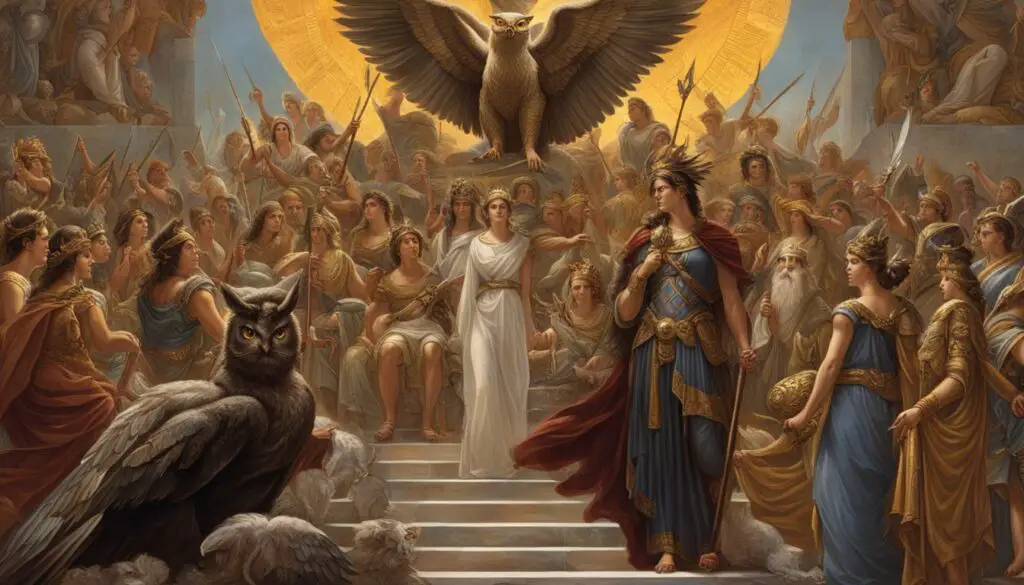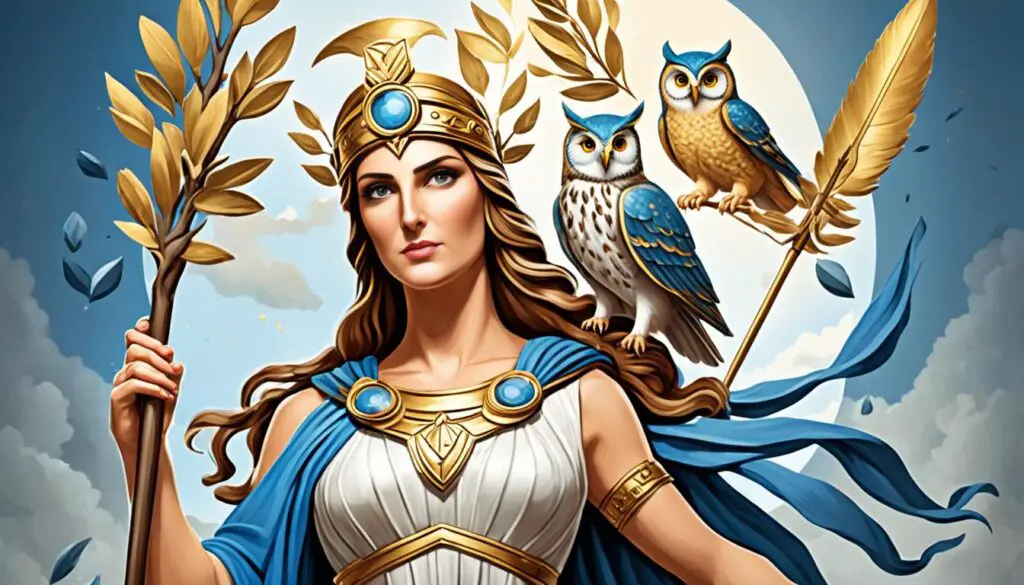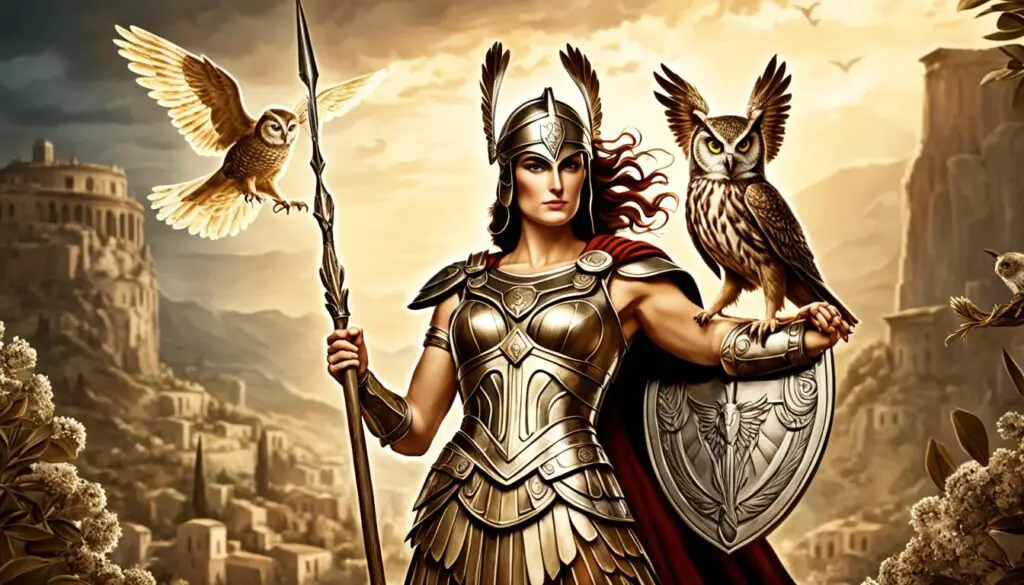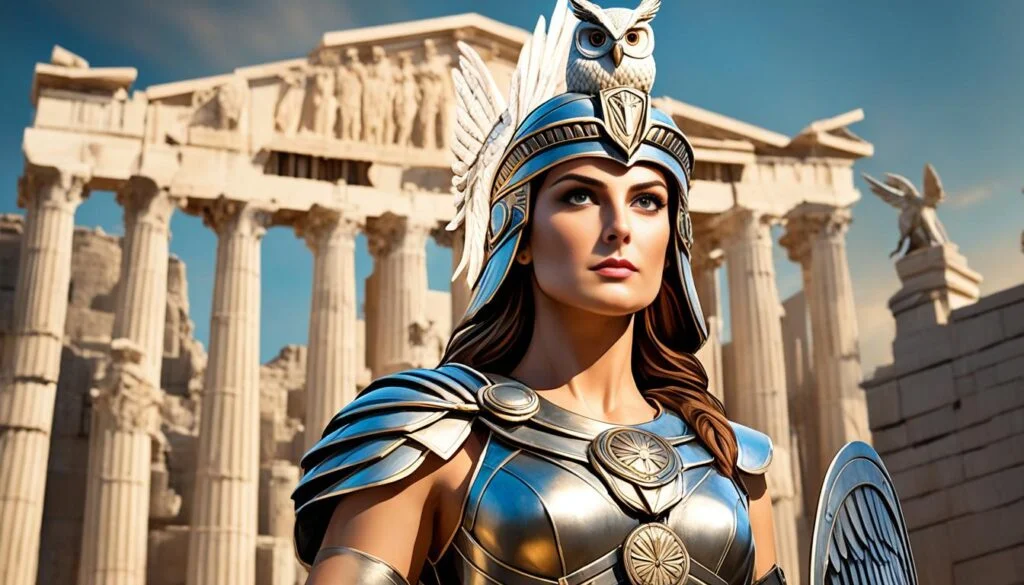Athena is a key figure in Greek mythology, known as the goddess of wisdom. She was important for her skill in war and her wise advice.
This powerful deity was closely tied to the city of Athens, where she was honored.
She looked like a powerful war goddess with her armor, sword, and shield. But she was also skilled in peaceful activities like crafts.
The owl, a symbol of wisdom, was a special animal associated with her.
Athena was known for her intellect and love of peace. Her role in the war was based on strategy and intelligence, unlike the god Ares.
Stories like Homer’s Iliad highlight her bravery and leadership.
Athena’s impact on ancient Greek culture was huge. Her birth and contest with Poseidon are celebrated in the Parthenon’s sculptures.
Festivals like the Panathenaea showed her importance in Athenian life.
Key Takeaways
- Athena is central to Greek mythology, embodying wisdom, war, and craftsmanship.
- Her primary association with Athens underscores her role as the city’s guardian.
- Athena’s martial attributes include armor, a helmet, a shield, and a lance.
- The owl symbol signifies her wisdom and strategic thinking.
- Athena’s influence spans intellectual, civilized warfare, and peacetime crafts.
Introduction to Athena
In ancient Greek mythology, Athena stood out. She was known for both wisdom and warfare among the Olympian gods.
Who was Athena? She symbolized strategy, and wisdom, and was a crafts goddess.
Athena’s birth story is unique. She sprung fully grown and in armor from Zeus’s forehead. This event underlines her power and wisdom.
Her name connected her closely to Athens, marking her as its protector.
Athena was a protector of cities, especially Athens, called Polias. She was linked to the owl, serpent, and olive tree.
These show her traits of wisdom, protection, and peace. The owl, which symbolizes intelligence, is strongly linked to her image.
Her skills reached many areas. Athena was known for her art and craft works. She had bright, keen eyes, showing her insight.
She guided heroes in wars, but preferred peace, saving war for just causes.
Athena had complex ties, especially with Hera and Ares. Despite this, Zeus favored her highly. She was not overshadowed by her siblings, given her wisdom.
The name Pallas highlights her victory in battle and her abilities.
Who was Athena? Her role exceeds just warfare and wisdom. She was crucial for promoting civilization and justice.
Athena’s diverse talents made her a central figure in Greek myths. She remains key in both ancient and modern stories.
The Origin Story of Athena
The tale of Athena’s birth is unlike any other. She sprang fully grown and armored from Zeus’s head.
This happened after he swallowed Metis, her mother, to avoid her powerful child.
A Unique Birth: Emerge from Zeus’ Head
In Athena’s mythology, she emerged uniquely, showing her warrior status. Clad in armor, she at once displayed herself as a goddess of both battle and wisdom.
This special birth made her a key player in both war strategy and intellect.

Siblings and No Mother
Athena’s birth stands out because she didn’t have a mother. Despite having six siblings from Zeus, she alone emerged without a mother’s involvement.
This highlights her extraordinary place in Greek myths.
Her unique birth and immediate association with war and wisdom shaped Athena.
These traits are the foundation of her timeless fame in ancient and current stories.
Athena’s Role in Greek Mythology
Athena is known in Greek myths as more than just wise and smart. She was a war goddess and the special goddess of Athens.
Her stories and influences shaped a lot of Greek culture and religion.
Patroness of Cities
Athena played a big role in Athens, showing her importance. She and Poseidon vied for the city’s patronage.
Athena’s gift of an olive tree won over the people, bringing peace and prosperity. This made her central to the city’s culture.
The famous Parthenon housed a huge statue of her called Athena Parthenos. This act showed she was the city’s main protector.

Goddess of Wisdom and War
Athena was different from Ares, the god of war. She cared more about smart fighting. She was always seen in her battle gear.
This showed her role as the war goddess.
She helped famous heroes in battles, like Jason and Hercules. In the Trojan War, she helped heroes with her smart plans.
Athena made sure important battles went the right way.
She wasn’t just about war. Athena was the goddess of crafts too. She focused on weaving and metalworking.
People celebrated these skills at festivals. This showed she was smart and good at war, but also creative.
Athena was a well-rounded goddess loved for her many talents.
Symbols and Attributes of Athena
The symbols and attributes linked to Athena are rich and full of meaning. They tell stories that show how wise and protective she is.
Her symbols highlight different parts of her, like her wisdom and smart moves.
The Owl: A Symbol of Wisdom
The owl symbolizes Athena’s strong connection to wisdom and good judgment. As the goddess of wisdom, the owl highlights Athena’s smart and clear thinking.
It’s one of over a dozen things marking her, but it’s special. It shows how much ancient people valued wise advice.

The Olive Tree and Aegis
The olive tree represents peace and shows that Athena is powerful. It’s linked to Athens, a city she won as her own by besting Poseidon.
Her aegis, a shield with Medusa’s head, signifies her protection and strength in battle.
These Athena symbols are key in art and stories, showing Athena’s might and care over her city.
Helmet and Spear
Athena’s helmet and spear speak to her role as a warrior goddess. She was always ready for battle and fought next to heroes.
Rembrandt’s painting of Pallas Athena captures her warrior spirit. These symbols underline her aspect of courage and strength, painting her as a goddess of war but also protection.
Who Was Athena: Understanding the Goddess Fully
The stories of Athena show she was wise and skilled in war. As a Greek goddess, she mixed bravery and advice.
She helped heroes and was key in the tale of Athens.

Athena was important in worship, being featured heavily in old texts. She was born from Zeus’s head, making her special.
She helped in farming and making things, showing her care for both work and beauty. Myths say she was great at tricks and changing shapes.
This showed her deep smarts and strategy.
Athena was known for wisdom in tales by Plato and others. She was honored in many places, like the Parthenon.
Her symbols like the owl and shield showed her skills and protection.
Athena’s Powers and Abilities
Athena, the Greek goddess of wisdom, stands out for her amazing powers and talents. Her divine skills placed her above others in battles and crafting.
This made her one of the top gods in ancient Greek myths.
War Strategies and Wisdom
Athena, as a war goddess, had unmatched intelligence. This helped her in tricky situations and when trying to outsmart other gods.
Her ability to plan tactics and strategies made her very important in fights.
She could also see into the future. This meant Athena could make plans that likely led to victory. She also helped her followers in peaceful times and warned them when danger was near.
Heroes like Achilles and Theseus were guided by her, showing how important her advice was in mythological wars.
Handicrafts and Practical Skills
As the goddess of crafts, Athena promoted practical and skillful work. She was known as the deity of crafts and solutions.
Many important inventions came from her guidance, like the chariot, olive tree, and plow.
These were vital for ancient Greek culture and progress.
Her weaving and magical skills also helped mortals create beautiful works. Athena could even change shape, making it easier to teach important lessons.
This showed her influence not just in war but also in peace, providing key skills for both times.
Myths and Legends of Athena
Athena is honored as a top deity in ancient Greece. She’s known for her smart plans, making things, and deep thinking.
Her part in Greek myths is wide and important.
Athena and the Trojan War
In the Trojan War, Athena plays a big part. In “The Iliad,” she helps Greek heroes. She gives strength to Diomedes, helping him win battles.
Athena also tries to bribe Paris with wisdom, but he picks Aphrodite’s offer. These stories show how Athena shaped the war’s results.
The Story of Medusa
A standout myth is about Medusa and Athena. Originally beautiful, Medusa was turned into a monster by Athena for disrespecting her.
Athena helps Perseus kill Medusa by giving him a mirror shield. This myth shows Athena’s strictness and cleverness.
Athena and the Heroic Perseus
Athena aids many heroes, including Perseus, in fighting Medusa. She gives Perseus wisdom and strategy vital for his victory.
Her help shows her key role in ancient stories of war and heroism.
Athena’s stories highlight her might and wisdom. She remains a key figure in ancient myths, influencing various tasks like war and cultural pursuits.
Her legacy is deeply impactful and timeless.
Athena in Art and Culture
Ancient times have seen Athena as a key figure in art and culture. She’s known as the goddess of wisdom and war.
Depictions of her show a strong guardian and the symbol of wisdom and skill in battle.
Depictions in Classical Art
In classic art, Athena appears as a noblewoman. She’s dressed in protective gear, complete with a shield and spear.
Her outfit includes a long robe and a helmet. She often wears the aegis, a cape with a snake edge, and the face of Medusa.
Statues show her as a warrior and protector. These works are found in many places, including the Parthenon temple in Athens.
This temple is a top tourist site, highlighting her long-lasting influence.
Renaissance to Modern Symbolism
The Renaissance brought classical themes back, including Athena. Artists then, and through later periods, portrayed Athena as a sign of wisdom and democracy.
They focused on symbols such as the owl, olive tree, and aegis.
Works from artists like Phidias showed Athena in grandeur. Today, modern art still draws from Athena’s ancient image.
She remains a powerful symbol of wisdom and battle prowess in both old and new art forms.
Athena’s Relationship with Other Gods
Athena has complex ties within the pantheon, showing alliances, rivalries, and family bonds.
Her relationships vary, from deep respect to open conflict, unveiling her diverse character.
This mix of connections underlines her key role as a Greek war goddess.
Zeus’s Favorite Daughter
Athena was special in the eyes of Zeus, her father, for her wisdom and strategic mind. She earned respect and power among the gods.
Her bond with Zeus highlights her crucial role and position within the pantheon.
The Rivalry with Poseidon
Athena and Poseidon had a long-lasting rivalry that influenced her place as a war goddess.
Their competition built the core of Athens’ foundation story. Despite this, they sometimes collaborated, revealing a nuanced relationship of both conflict and cooperation.
Interactions with Ares and Apollo
Athena interacted differently with her half-brothers, Ares and Apollo, emphasizing her role. With Ares, her strategy differed vastly, showcasing her wisdom and warfare tactics.
The dynamic with Apollo, however, remains enigmatic, deepening the intrigue of Athena’s family bonds.
Major Festivals and Worship Practices
The city of Athens held special Athena festivals to show their love for her. These events were very important.
They showed how much the people valued Athena for her wisdom and bravery.
The Panathenaic Festival
One big festival was the Panathenaic, happening every four years in July. It celebrated Athena’s birthday.
The festivities included sports and music contests, showcasing Athenians’ talents. Scholars have written a lot about this festival, connecting it to Athenian pride and identity.
The Panathenaea also had cultural activities. These included the recitation of poems, regulated by Hipparchus.
The festival wasn’t just fun; it was also a way to honor Athena together as a community.
Rituals and Offerings
The Plynteria was another big event, happening every year. It included a special cleaning of Athena’s statue.
This cleaning was thought to renew the statue’s divine presence. People made a lot of different offerings, from sacrifices to clothes.
Books by Neils from the 90s offer more details about these rituals.
The Parthenon was a famous temple to Athena on the Acropolis. It showed her importance in law and civilization.
Inside was a huge statue of Athena, the centerpiece of their worship. The building was filled with art that showed Athena’s honored role.
Outside of Athens, Rome also celebrated Athena as Minerva. This adaptation highlighted her values, like wisdom and art.
Works by researchers, including Parker in 2005, have explored the significance of her worship globally.
Athena in Homer’s Epics
In Homer’s epics, Athena stands out as a figure of strength and wisdom. She is famous as the “blue-eyed maid” and “heaven’s triumphant maid.”
Athena is not just any goddess but a powerful symbol of Greek war and wisdom. Her involvement in the Iliad shapes the fates of key heroes with her courage and divine help.
A Role in the Iliad
Athena’s actions in the Iliad show her clever and practical sides. She joins direct battles, pushing the Greeks forward with her wisdom.
Her role in deciding the Apple of Discord shows her competitive side. Athena’s smarts shine in turning points, like helping Achilles defeat Hektor and tricking enemies in war.
Her Guidance in the Odyssey
In the Odyssey, Athena changes from a warrior to a guide. She protects Odysseus and his family, leading and helping them at key times.
Athena guides Telemachus on a path of growth and helps Odysseus overcome challenges with her wisdom. She shows heroes they can also win through cleverness and resourcefulness.
Athena plays a central part in the epic by mentoring Telemachus and guarding Odysseus. She is a mixture of strength, wisdom, and smartness.
Learn more about Athena’s important roles in the Homeric epics by visiting Athena in Homeric Epics.
Frequently Asked Questions
What was Athena known for?
Athena was known for her wisdom, courage, and strategic warfare skills. She was also the goddess of crafts, weaving, and pottery. Athena played a significant role in many Greek myths and was revered as a protector of cities, particularly Athens, which was named after her.
Why did Athena curse Medusa?
Athena cursed Medusa because she was desecrated in Athena’s temple by Poseidon. As punishment, Athena transformed Medusa into a Gorgon with snakes for hair, and anyone who looked directly at her would turn to stone.
Is Athena the god of love?
No, Athena is not the god of love. The goddess of love in Greek mythology is Aphrodite. Athena is the goddess of wisdom, warfare, and crafts.
Did Poseidon and Athena date?
No, Poseidon and Athena did not date. They were often depicted as rivals, particularly in the myth of the contest for the patronage of Athens, which Athena won by offering the olive tree, while Poseidon offered a saltwater spring.
What is Athena’s weakness?
Athena’s weakness is her lack of compassion and tendency towards being overly rational and strategic. This can sometimes lead to a lack of emotional connection or understanding, making her seem aloof or unapproachable.
Who was Athena’s husband?
Athena did not have a husband. She was one of the virgin goddesses, along with Artemis and Hestia, and she remained unmarried and celibate, dedicating herself to wisdom, war, and her role as a protector.
What were Athena’s 3 powers?
Athena’s three main powers were: – Wisdom and intelligence: She was known for her strategic thinking and problem-solving abilities. – Warfare: Athena was a skilled warrior and strategist, often depicted with armor and weapons. – Crafts: She was the goddess of weaving, pottery, and other crafts, inspiring creativity and skill in artisans.
What is the symbol of Athena?
The symbol of Athena is the owl, which represents wisdom and knowledge. Other symbols associated with her include the olive tree, the aegis (a protective cloak or shield), and the helmet and spear, signifying her warrior aspect.




